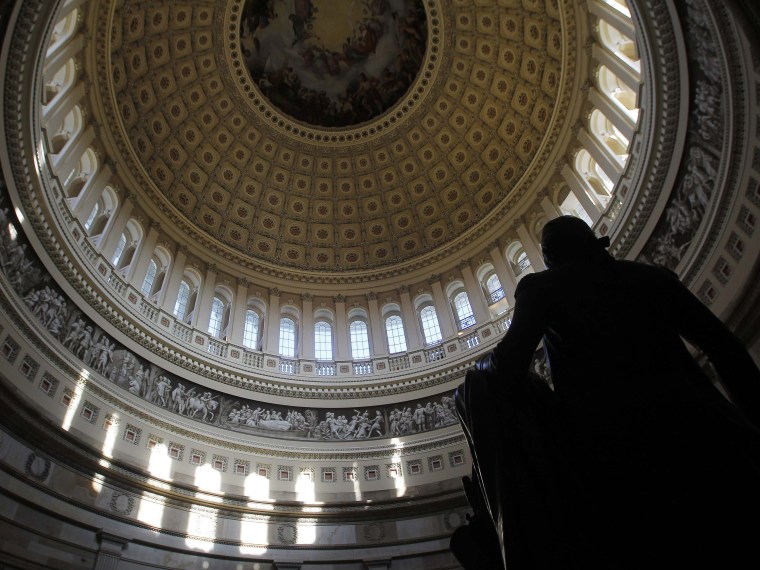Before the public was able to read Special Counsel Robert Mueller's report last week, most Democratic leaders were eager to downplay talk of Donald Trump's impeachment, if they were willing to acknowledge the question at all. But now that the report is out, and we've seen the evidence of the president's alleged crimes, conditions are different.
At least a little.
Sen. Elizabeth Warren (D-Mass.), who wasn't advocating in support of impeachment before, called on Friday for impeachment proceedings to begin, and fleshed out her reasoning in an interview with Rachel. If, however, those who agree with the senator's position hoped other 2020 presidential contenders would soon follow, they were left wanting over the weekend.
In practice, however, the opinions of Trump's would-be successors are arguably less important than House Democrats' opinions -- the latter would be responsible for actually initiating the process and seeing it through -- and over the weekend, the impeachment door appeared ajar.
Democrats "can foresee" the possibility of impeachment proceedings against President Donald Trump following the release of special counsel Robert Mueller's report.Speaking on the Sunday political talk shows, the chairmen of three key House investigatory committees sounded open to the possibility of bringing impeachment proceedings against the president.
It would be an overstatement to say leading Democrats are pursuing impeachment with any real vigor, but their willingness to consider the possibility appears to be growing.
House Oversight Committee Chairman Elijah Cummings (D-Md.), for example, said yesterday he's "not there yet" on impeachment, but added, "I can foresee that possibly coming."
House Judiciary Committee Chairman Jerry Nadler (D-N.Y.) wouldn't rule out any possible outcomes, though he did tell NBC News' Chuck Todd, "Obstruction of justice, if proven, would be impeachable."
Perhaps the most nuanced posture came by way of House Intelligence Committee Chairman Adam Schiff (D-Calif.), who said Trump's Russia scandal is "far more serious than Watergate," adding that the president's misconduct, in "a normal circumstance," would be "without question within the realm of impeachable offenses."
Schiff went on to say, however, "We are, unfortunately, in an environment today where the GOP leadership, people like Kevin McCarthy, are willing to carry the president's water no matter how corrupt or unethical or dishonest the president's conduct may be.... It means that an impeachment is likely to be unsuccessful."
And that, in a nutshell, seems to be the Democratic dilemma. There's a principled reason to pursue presidential impeachment: Trump stands credibly accused of obstructing justice, repeatedly and brazenly, and basic accountability and democratic norms demands congressional action in the face of documented corruption. Presidents who commit impeachable offenses should face an impeachment. It's as simple as that.
There's also a practical reason not to: Congressional Republicans will not even consider holding Trump accountable for his alleged misdeeds, which means there would be a bitter and partisan process, which also means the articles of impeachment, if approved by the Democratic-led House, would inevitably fail in the Republican-led Senate.
Proponents of the practical argument point out, accurately, that most Americans don't like Trump, but they're not yet on board with impeachment. Proponents of the principled argument point out, accurately, that polls can change, and to base decisions about the value of the rule of law on public-opinion surveys is madness.
Proponents of the practical argument point out, accurately, that Democrats are on stronger footing when the public debate shifts away from Trump's scandals and toward his unpopular policy agenda. Proponents of the principled argument point out, accurately, that if the possibility of impeachment were to disappear immediately, Republicans wouldn't engage in a substantive debate over governing, but rather, they'd demand revenge for a Russia investigation they consider illegitimate and possibly criminal.
Proponents of the practical argument point out, accurately, that there's little electoral value in picking an unpopular impeachment fight that's likely to give new motivations to the Republican base, help GOP fundraising, and drown out discussion of the issues where Dems dominate. Proponents of the principled argument point out, accurately, that it's tough to guess the political implications of pursuing impeachment against an unpopular president; the cost of ignoring the wishes of the Democratic base carries costs, too; and the rule of law is more important than speculation about what may or may not move the polls a few points.
If you're waiting for me to take a side in this fight, I'm afraid you'll have to keep waiting. I don't know.
House Democrats will apparently try to work out a plan over the next few weeks. Watch this space.
